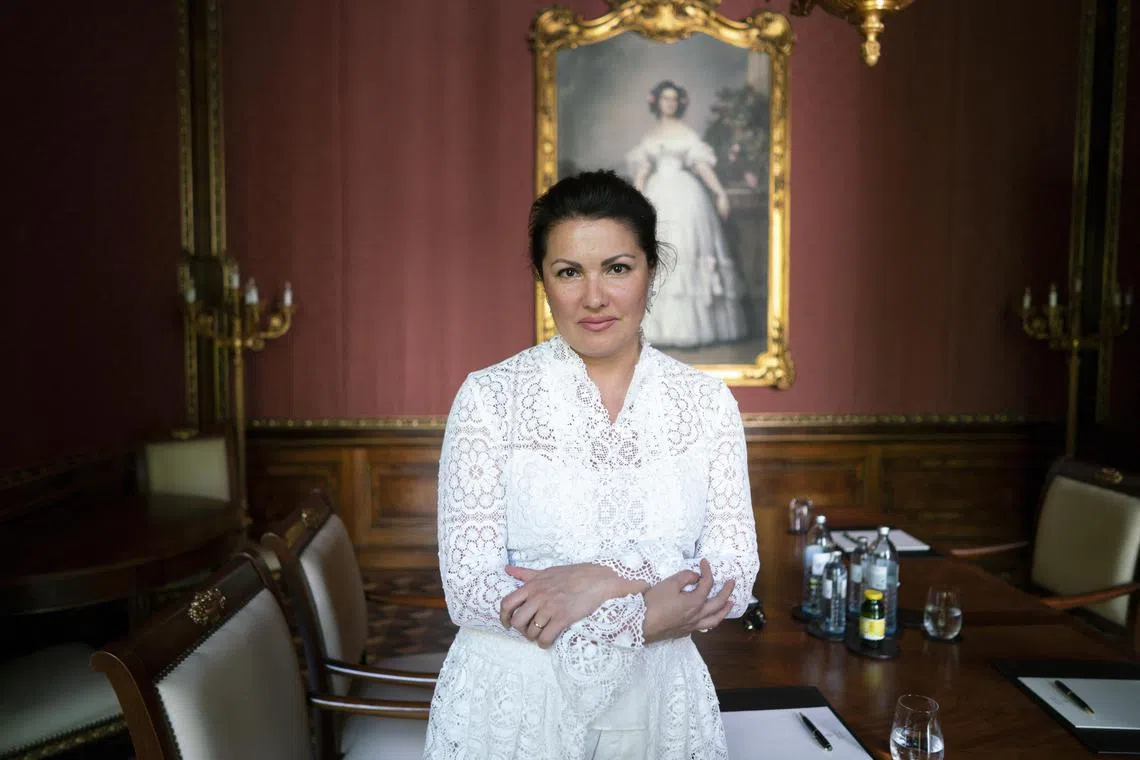New York’s Met Opera ordered to pay Russia soprano Anna Netrebko for cancelled performances
Sign up now: Get ST's newsletters delivered to your inbox

Anna Netrebko still has a relatively busy performing schedule, although she continues to face protests and calls that she be banned from the global stage.
PHOTO: AFP
NEW YORK – The Metropolitan Opera has been ordered by an arbitrator to pay Russian soprano Anna Netrebko more than US$200,000 (S$268,000) for performances it cancelled last year after she declined to denounce Russian President Vladimir Putin following the invasion of Ukraine.
The arbitrator, in a decision issued last month that has not been previously reported, ruled that the Met should compensate her for 13 cancelled performances – including appearances in Don Carlo this season and La Forza del Destino and Andrea Chenier next season. A contractual agreement, known as “pay or play”, requires institutions to pay performers even if they later decide not to engage them.
The Met argued that Ms Netrebko, one of opera’s biggest stars, was not entitled to payment because of her refusal to comply with the company’s demand that she denounce Mr Putin, which it said had violated its conduct clause. Ms Netrebko endorsed him for president in 2012 and had spoken glowingly of him before the invasion in 2022.
The arbitrator, Mr Howard Edelman, found that “there is no doubt she was a Putin supporter, as she had a right to be”. But he added that aligning with Mr Putin was “certainly not moral turpitude or worthy, in and of itself, of actionable misconduct”.
Ms Netrebko had been seeking an additional US$400,000 in fees for engagements in coming seasons that had been discussed but not formally agreed to, including leading roles in Puccini’s Manon Lescaut and Tosca, as well as Verdi’s Macbeth and Tchaikovsky’s The Queen Of Spades. She earned the Met’s current fee for top artistes of about US$15,000 a performance.
But the arbitrator found that she was not entitled to fees for those performances because the contracts had not been executed.
In addition, he imposed a penalty of nearly US$30,000 on Ms Netrebko for making “highly inappropriate” statements after the invasion, including sharing a text on social media that used an expletive to refer to her Western critics, whom she called “as evil as blind aggressors”.
In addition to endorsing Mr Putin, Ms Netrebko has occasionally lent support to his policies. When in 2014 she donated to an opera house in Donetsk, a war-torn city in Ukraine controlled by Russian separatists, she was photographed holding a separatist flag.
The Met did not comment on the specifics of the ruling but defended its decision to cancel her performances.
“Although our contracts are ‘pay or play’, we didn’t think it was morally right to pay Netrebko anything considering her close association with Putin,” Mr Peter Gelb, the Met’s general manager, said in an interview.
He added: “It’s an artistic loss for the Met not having her singing here. But there’s no way that either the Met or the majority of its audience would tolerate her presence.”
Mr Sam Wheeler, national executive director of the American Guild of Musical Artists, the union that represented Ms Netrebko, praised the decision, saying it would help protect the rights of artistes seeking compensation for cancelled engagements.
“‘Pay-or-play’ is the bedrock of our collective bargaining agreements across the country, and we will always defend ‘pay-or-play’ provisions to the fullest extent possible,” he added in a statement.
Ms Netrebko still has a relatively busy performing schedule though she continues to face protests and calls that she be banned from the global stage. A planned concert this month in Taiwan was cancelled at the last minute because of concerns about her connections to Mr Putin.
She is set to perform a recital at La Scala, in Milan, on Sunday, and will return there this summer for a production of Macbeth. Her engagements next season include a concert at the Wiener Konzerthaus, and appearances at the Salzburg Easter Festival in Austria.
Facing a series of cancellations in the West last year, she sought to distance herself from Mr Putin, issuing a statement saying that she had met him only a few times and that she was not “allied with any leader of Russia”.
She also cancelled her appearances in Russia. But she has avoided directly criticising Mr Putin or addressing her record of support for him.
Separately, the Met announced on Friday that it was firing Ms Netrebko’s husband, tenor Yusif Eyvazov, from a production of Tosca that is set to open on March 30. Mr Eyvazov, who had been engaged to play the role of painter Cavaradossi in six performances, will be replaced by Matthew Polenzani. Rehearsals are to begin on Monday.
Mr Gelb said he had hoped Mr Eyvazov would withdraw from the production but that he had decided to fire him primarily because of comments he made last year criticising soprano Angel Blue.
She withdrew from a production of Aida at the Arena di Verona after photos of Ms Netrebko and other artistes performing there in dark makeup circulated on social media.
Mr Gelb also said that Mr Eyvazov’s association with Ms Netrebko was problematic and that he did not want to disrespect Ukrainian soprano Liudmyla Monastyrska, who will sing the role of Tosca in four performances.
The Met said Eyvazov would be compensated for the cancelled Tosca performances. NYTIMES


